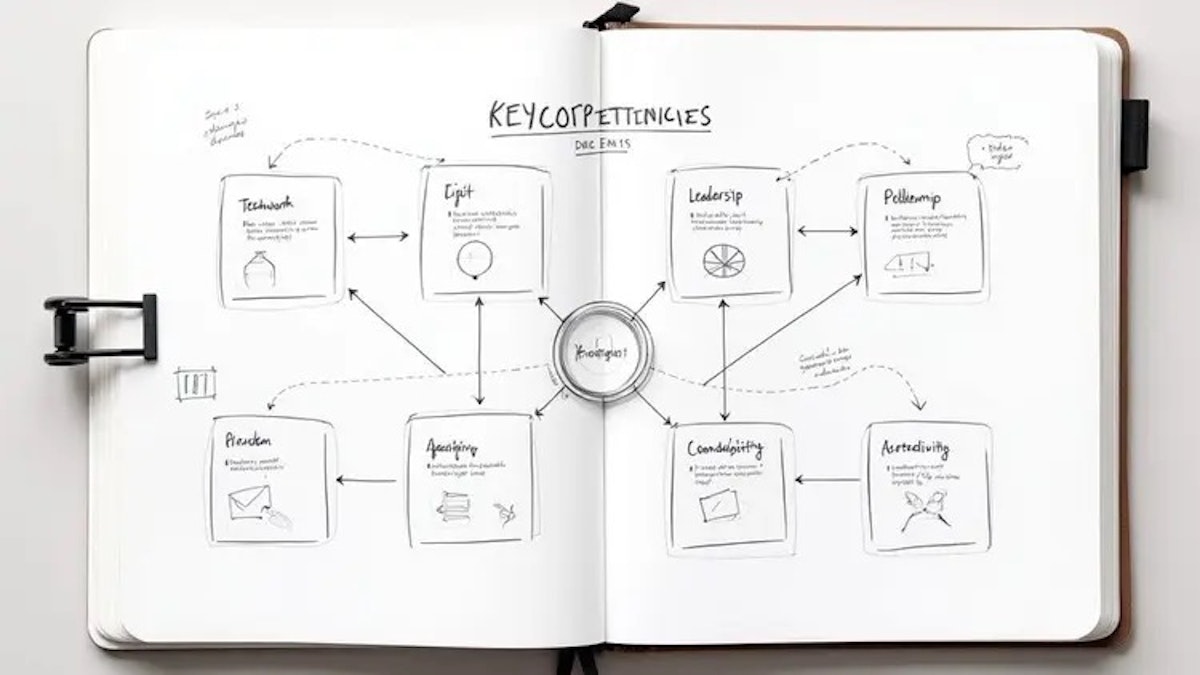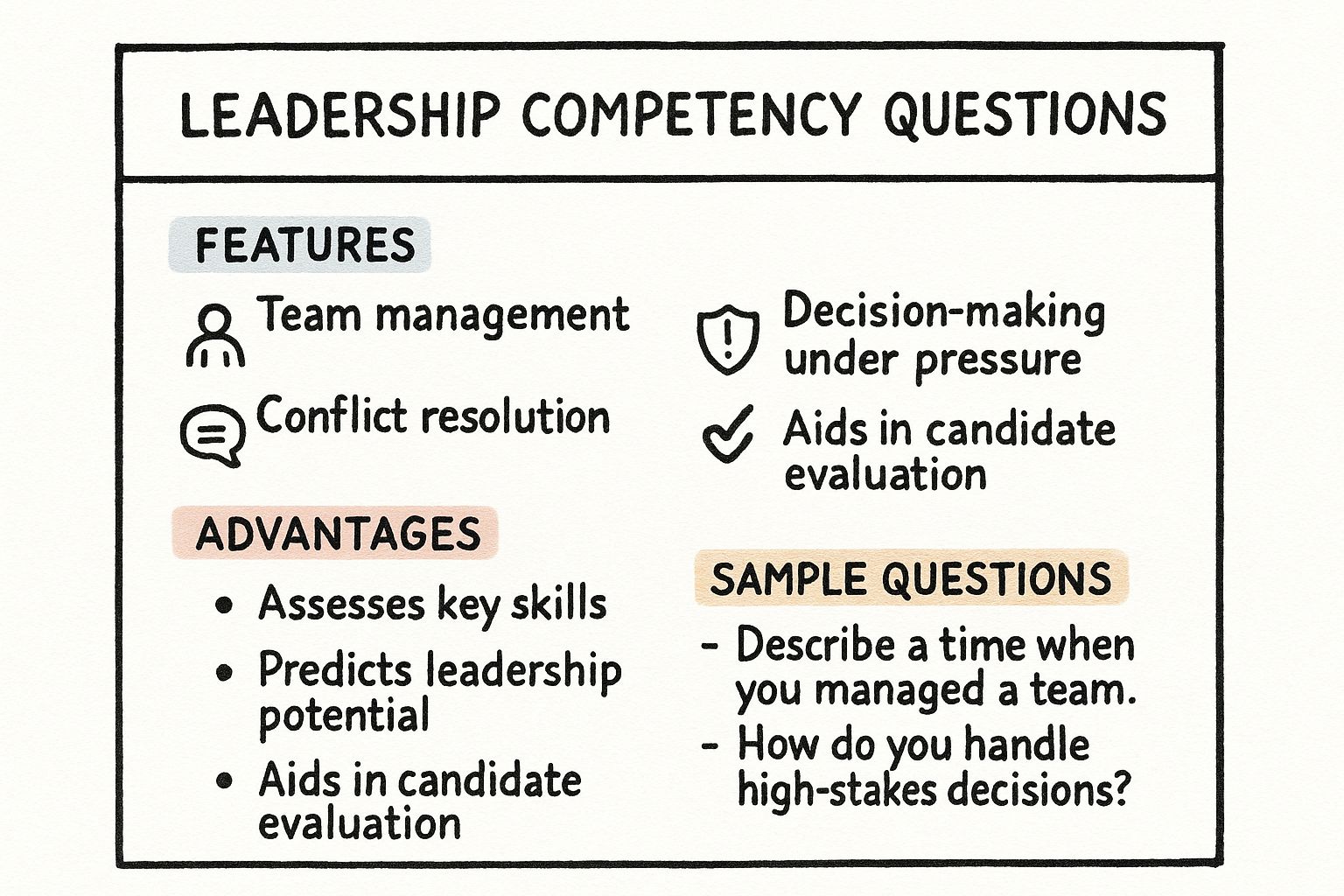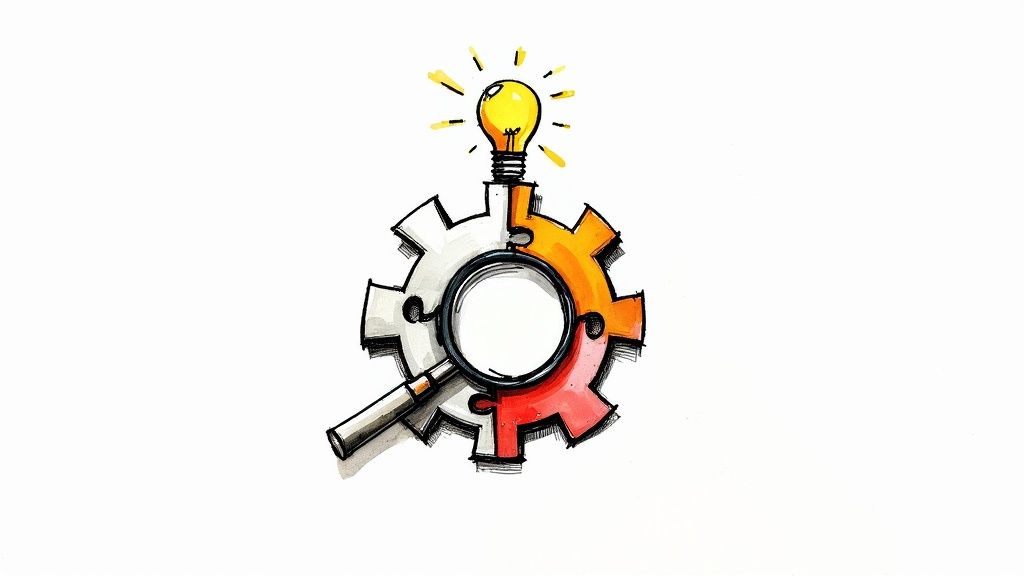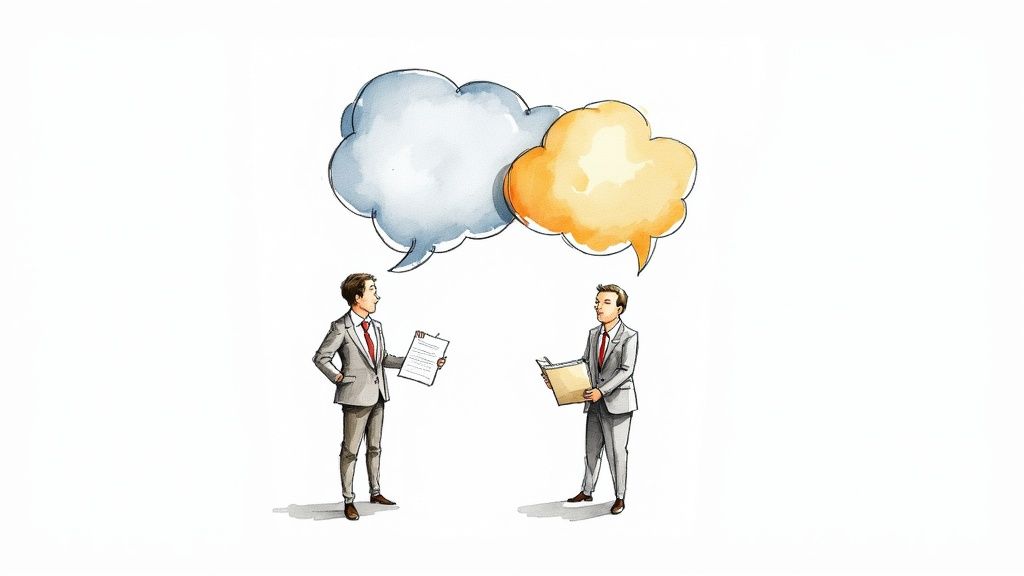Top 8 Competency Based Interview Questions for 2025 Hiring

In today's competitive job market, predicting a candidate's future performance is the ultimate goal. However, traditional interview questions often fall short, failing to reveal how a candidate will actually behave on the job. A meta-analysis by Schmidt, Oh, & Shaffer published in Personnel Psychology found that behavioral interviews, a form of competency-based assessment, have a validity of .51 in predicting job performance, significantly higher than unstructured interviews (.28). This is where competency based interview questions come in. They shift the focus from hypothetical scenarios to past behaviors, providing concrete evidence of a candidate's skills, abilities, and cultural fit.
This guide moves beyond generic advice to provide a strategic toolkit for hiring managers and HR professionals. We will break down eight key competency categories, from Leadership and Problem-Solving to Adaptability and Communication. For each category, you'll get curated question examples, detailed analysis of what to look for in a response, and evidence-backed insights to build a high-performing, value-aligned team. To help in crafting more effective inquiries, consider leveraging an advanced online tool like an interview question generator to tailor questions to specific roles. Our goal is to equip you to dissect candidate responses, uncover true potential, and make data-driven hiring decisions.
1. Leadership Competency Questions
Leadership competency questions are a cornerstone of modern hiring, designed to unearth a candidate's potential to guide, influence, and inspire others toward achieving collective goals. Unlike hypothetical questions, these behavioral prompts require candidates to draw from past experiences, revealing concrete evidence of their leadership style, decision-making capabilities, and resilience under pressure. This approach helps organizations identify individuals who can not only manage tasks but truly lead people.
According to the Global Leadership Forecast 2023 by DDI, organizations with strong leadership development practices are 4.2 times more likely to have high financial performance. This data highlights the critical need to accurately assess this skill. These types of competency based interview questions move beyond a candidate simply stating they are a "good leader" and demand proof through detailed narratives of past challenges and triumphs.
Evaluating Candidate Responses
To effectively assess a candidate's leadership skills, listen for responses structured using the STAR method (Situation, Task, Action, Result). This framework provides a clear, logical narrative of their experience.
- Situation: The context of the story. Was it a high-stakes project or a routine team management issue?
- Task: Their specific responsibility in that situation. What goal were they trying to achieve?
- Action: The specific steps they took. Look for "I" statements that show ownership, delegation, and strategic thinking.
- Result: The measurable outcome. Strong answers will quantify success with metrics like a 15% increase in team productivity or a 10% reduction in project delays.
The following infographic summarizes the core components and benefits of asking leadership competency questions.

As the graphic illustrates, these questions effectively probe a candidate’s ability to manage teams, make tough decisions, and resolve conflicts, providing a well-rounded view of their leadership acumen. By focusing on these areas, you can identify leaders who not only deliver results but also foster a positive and productive environment, which is essential for building a culture of excellence.
2. Problem-Solving Competency Questions
Problem-solving competency questions are designed to evaluate a candidate's ability to navigate and resolve complex challenges. These behavioral questions require individuals to detail their analytical process, from identifying the core issue to implementing a successful solution. This method allows employers to gauge a candidate's critical thinking, resourcefulness, and decision-making skills in a real-world context, moving beyond hypothetical scenarios to assess proven capabilities.
This interview style is critical for roles demanding strong analytical and strategic thinking, often utilized in industries like technology, engineering, and management consulting. The goal of these competency based interview questions is to see how a candidate deconstructs a problem, gathers relevant information, considers various options, and justifies their chosen path. This approach provides deep insight into their ability to handle the inevitable obstacles that arise in any role.
Evaluating Candidate Responses
When evaluating answers to problem-solving questions, look for a structured and logical thought process. The best responses will demonstrate a clear, repeatable framework for tackling challenges, often aligning with the STAR method (Situation, Task, Action, Result).
- Situation: The candidate should clearly define the complex problem they faced. What was the context and why was it a significant issue?
- Task: What was their specific role or objective in solving this problem?
- Action: This is the core of the answer. Listen for the specific steps taken to analyze the issue, such as data gathering, brainstorming, or root cause analysis. Look for evidence of both logical deduction and creative thinking.
- Result: A strong response will articulate a clear, positive outcome. Ideally, this should be quantified with specific metrics, like "reduced system errors by 25%" or "cut down resolution time by 40%."
The following infographic highlights the key elements an interviewer should look for when a candidate describes their problem-solving approach.

As shown in the graphic, a top-tier candidate will effectively articulate how they analyze situations, generate solutions, and make sound decisions. By focusing on these core competencies, you can identify individuals who not only fix immediate issues but also contribute to a culture of continuous improvement and innovation, a valuable asset detailed in articles on building resilient teams.
3. Communication Competency Questions
Communication competency questions are designed to evaluate how a candidate conveys information, listens to others, and adapts their message for different audiences. These behavioral questions require candidates to provide real-world examples, moving beyond a simple claim of being a "strong communicator." They reveal a person's ability to articulate complex ideas, handle sensitive conversations, and build rapport, all of which are critical for collaboration and productivity.
Effective communication is consistently ranked among the top skills employers seek. According to LinkedIn's 2024 Most In-Demand Skills report, communication topped the list as the most sought-after skill by employers globally. This highlights why hiring managers use these competency based interview questions to rigorously vet a candidate’s ability to share information clearly and persuasively, ensuring they can contribute effectively within a team and represent the organization professionally.
Evaluating Candidate Responses
To accurately gauge communication skills, listen for responses that demonstrate clarity, empathy, and adaptability. The STAR method (Situation, Task, Action, Result) is an excellent framework for candidates to structure their answers, providing a complete picture of their capabilities.
- Situation: The context for the communication. Was it a high-stakes client presentation, a conflict resolution with a colleague, or a company-wide announcement?
- Task: Their specific communication goal. Did they need to persuade, inform, de-escalate, or clarify?
- Action: The specific communication methods they used. Look for details on their choice of words, tone, body language, and medium (e.g., email, in-person meeting).
- Result: The outcome of their communication. Strong answers will connect their actions to a positive result, such as securing client buy-in, resolving a team misunderstanding, or successfully explaining a technical project to non-technical stakeholders.
The following infographic highlights the key areas that communication competency questions explore.

As the graphic shows, these questions effectively assess a candidate’s capacity for active listening, clarity, and persuasion. By probing these specific skills, you can identify individuals who not only prevent misunderstandings but also build stronger, more collaborative working relationships. This focus on communication complements other evaluation methods, as understanding these traits can be enhanced by also using a personality assessment for hiring.
4. Teamwork and Collaboration Competency Questions
Teamwork and collaboration competency questions are essential for evaluating a candidate's ability to operate effectively within a group dynamic. These questions probe beyond a simple claim of being a "team player," requiring candidates to provide concrete examples of their interpersonal skills, conflict resolution tactics, and contributions to collective success. In today's increasingly interconnected workplaces, where cross-functional teams are the norm, identifying individuals who can build positive working relationships is paramount.
Companies that prioritize collaboration, such as those using agile development or matrix management structures, rely on these competency based interview questions to build cohesive and high-performing teams. A McKinsey Global Institute report found that well-designed collaborative technologies and processes can raise the productivity of interaction workers by 20 to 25 percent. This highlights the tangible business impact of hiring genuinely collaborative individuals.
Evaluating Candidate Responses
To accurately gauge a candidate's collaborative spirit, look for answers that follow the STAR method (Situation, Task, Action, Result). This format helps you understand their specific role and impact within a team setting.
- Situation: The context of the team project or interaction. Was it a high-pressure deadline or a routine collaboration?
- Task: Their specific role and what the team was tasked with achieving.
- Action: The specific, collaborative steps they took. Look for "we" statements that show a team mindset, but also "I" statements that clarify their personal contribution, such as facilitating discussions, supporting a struggling colleague, or integrating feedback.
- Result: The outcome for the team. Strong answers demonstrate shared success, such as "Our team successfully launched the feature on time," or "We improved process efficiency by 20%."
Effective responses will showcase a candidate's ability to navigate diverse personalities, share credit, and prioritize the group's objective over individual ambition. By focusing on these narrative proofs, you can better predict how a candidate will integrate into and enhance your team-oriented culture.
5. Adaptability and Change Management Competency Questions
Adaptability and change management questions are designed to gauge a candidate's resilience, flexibility, and capacity to navigate organizational shifts. These prompts are crucial for identifying individuals who can maintain high performance and a positive attitude during times of uncertainty, technological disruption, or strategic pivots. This skill is vital across industries, from fast-paced tech startups to established firms undergoing digital transformation.
The modern workplace is in a constant state of flux. Research from Gartner shows that the average employee now experiences more frequent and complex organizational change than in previous years, making adaptability a core survival mechanism. These types of competency based interview questions force candidates to provide evidence of their agility, moving beyond claims of being "flexible" to show how they've actually managed and embraced change.
Evaluating Candidate Responses
To evaluate a candidate's adaptability, listen for STAR-based answers that show not just survival, but proactive engagement with change. The best responses will demonstrate a growth mindset and a willingness to learn.
- Situation: The context of the change. Was it a new company-wide software, a sudden team restructuring, or a shift in project priorities?
- Task: Their role within that change. Were they expected to simply adopt a new process or lead others through it?
- Action: The specific steps they took to adjust. Look for "I" statements that highlight learning a new skill, seeking out information, and supporting teammates. Did they resist initially or embrace the challenge?
- Result: The measurable outcome of their adaptation. Strong answers will connect their actions to positive results, such as quickly reaching proficiency in a new system, preventing a drop in team morale, or successfully meeting a revised deadline.
Candidates who also describe how they helped others navigate the transition demonstrate a higher level of competency. This shows they are not just adaptable themselves but can also act as stabilizing agents within their team, a critical asset for any organization focused on building a resilient and forward-thinking workforce.
6. Customer Service Competency Questions
Customer service competency questions are designed to assess a candidate's ability to represent the organization positively while meeting and exceeding customer expectations. These prompts delve into a candidate's empathy, problem-solving skills, and resilience in customer-facing roles. They require candidates to provide real-world examples of how they've handled difficult situations, managed expectations, and fostered positive relationships, moving beyond simple claims of being "customer-focused."
Data from Salesforce's State of the Connected Customer report reveals that 88% of customers believe the experience a company provides is as important as its products or services. This statistic underscores the value of using competency based interview questions to find employees who can deliver that exceptional experience. Organizations known for world-class service, for instance, build their reputations on a standard that begins with hiring individuals who possess an innate service-oriented mindset.
Evaluating Candidate Responses
To accurately evaluate a candidate's customer service capabilities, listen for responses that clearly follow the STAR method (Situation, Task, Action, Result). This ensures the candidate provides a comprehensive narrative demonstrating their skills in action.
- Situation: The context of the customer interaction. Was it a complex complaint or a standard inquiry?
- Task: Their specific goal. Was it to de-escalate an angry customer, find a creative solution, or simply provide information?
- Action: The specific steps they took. Look for "I" statements that highlight empathy, active listening, and problem-solving.
- Result: The measurable outcome. Strong answers will detail how the customer's satisfaction was restored, often leading to retained business or positive feedback.
A strong candidate will not only resolve the immediate issue but also demonstrate an understanding of how their actions impact the broader customer relationship and the company's reputation. This focus on positive interactions is crucial, as excellent service directly influences morale and staff loyalty, which is a key factor when you want to improve employee retention. By hiring service-oriented individuals, you create a more positive work environment for everyone.
7. Time Management and Prioritization Competency Questions
Time management and prioritization questions are designed to evaluate a candidate’s ability to handle a demanding workload, organize tasks effectively, and meet deadlines. Popular in fast-paced industries and project-driven roles, these questions probe how an individual navigates competing demands and maintains productivity under pressure. They require candidates to articulate their strategies for organizing their work, proving they can operate efficiently in a complex environment.
In today's workplace, where employees often juggle multiple projects, the ability to prioritize is not just a soft skill but a critical driver of business outcomes. The Project Management Institute (PMI) consistently reports that strategic alignment, which is heavily dependent on effective prioritization, is a key factor in project success rates. These types of competency based interview questions push candidates beyond simply saying they are "organized" and compel them to demonstrate their systematic approach to managing their time and responsibilities.
Evaluating Candidate Responses
When assessing a candidate's time management skills, look for detailed responses that showcase a clear and repeatable system. The STAR method (Situation, Task, Action, Result) is an excellent framework for candidates to structure their answers, providing a coherent narrative of their abilities.
- Situation: The context of the challenge. Was it a period of high volume with multiple overlapping deadlines, or a sudden, unexpected project that disrupted their workflow?
- Task: Their specific objective. Were they tasked with completing several critical projects simultaneously or re-prioritizing their entire workload due to a shift in company strategy?
- Action: The specific methods and tools they used. Look for "I" statements that describe their personal system, such as using an Eisenhower Matrix, a specific project management software, or time-blocking techniques.
- Result: The measurable outcome. Strong responses will quantify their success with clear metrics, such as "All three projects were delivered on or before their deadlines," or "By reprioritizing my tasks, I was able to address the urgent client issue within two hours, preventing escalation."
By focusing on these elements, you can determine if a candidate has a proactive and structured approach to their work or if they reactively handle tasks as they arise. A strong candidate will also mention how they communicate their priorities and workload to stakeholders, demonstrating transparency and collaborative skills. This insight is crucial for identifying individuals who can maintain high performance and reliability, even when faced with a challenging and dynamic workload.
8. Initiative and Proactivity Competency Questions
Initiative and proactivity competency questions are designed to identify candidates who are self-starters, capable of identifying opportunities and acting on them without direct instruction. These prompts delve into a candidate's history of taking ownership, solving problems before they escalate, and driving improvements independently. In today's fast-paced work environments, employers seek individuals who don't just follow orders but actively contribute to the organization's growth and efficiency.
Assessing this competency is crucial, especially in roles requiring autonomy and an entrepreneurial mindset. These types of competency based interview questions help distinguish passive employees from proactive contributors. Candidates who can demonstrate initiative are often more engaged and motivated, bringing a sense of ownership that can be transformative for a team or project.
Evaluating Candidate Responses
To effectively evaluate a candidate's initiative, look for clear evidence of self-directed action within their STAR method (Situation, Task, Action, Result) responses. Their narrative should highlight their ability to see beyond their immediate duties.
- Situation: The context where they noticed a gap, inefficiency, or potential problem. Was it a recurring issue that others ignored?
- Task: The goal they set for themselves. What did they decide needed to be done?
- Action: The specific, independent steps they took. Emphasize their thought process in identifying the opportunity and their courage in acting on it.
- Result: The measurable positive impact of their initiative. Strong answers will quantify the outcome, such as "streamlined the reporting process, saving 5 hours per week" or "developed a new tracking template that reduced errors by 20%."
Effective responses demonstrate not just action, but also foresight and calculated risk-taking. Candidates should explain why they chose to act and how they identified an opportunity that others may have missed. This reveals a deeper level of strategic thinking and a commitment to continuous improvement, which are hallmarks of a truly proactive employee.
Competency-Based Interview Questions Comparison
| Competency Area | Implementation Complexity 🔄 | Resource Requirements ⚡ | Expected Outcomes 📊 | Ideal Use Cases 💡 | Key Advantages ⭐ |
|---|---|---|---|---|---|
| Leadership Competency Questions | Moderate - requires evaluator skill and context consideration | Moderate - involves interviewer training and behavioral probing | Identifies leadership potential, decision-making, team motivation | Leadership roles, management track, high-responsibility positions | Reveals management style, emotional intelligence, strategic thinking |
| Problem-Solving Competency Questions | Moderate - needs structured scenarios | Moderate - requires technical and analytical knowledge | Assesses analytical thinking, creativity, persistence | Tech, engineering, consulting, innovative roles | Highlights cognitive abilities, innovative mindset, practical skills |
| Communication Competency Questions | Low to moderate - straightforward | Low - based on verbal and written scenarios | Measures clarity, listening, adaptability, interpersonal skills | Customer-facing, PR, educational, healthcare | Critical for diverse roles, reveals emotional intelligence and clarity |
| Teamwork and Collaboration Questions | Moderate - context-dependent evaluation | Moderate - needs scenarios covering team dynamics | Evaluates cooperation, conflict resolution, cultural fit | Agile, project management, matrix teams | Assesses interpersonal skills, emotional intelligence, diverse teamwork |
| Adaptability and Change Management | Moderate - subjective evaluation possible | Low to moderate - focuses on behavioral examples | Measures resilience, flexibility, learning agility | Startups, digital transformation, fast-changing industries | Identifies growth mindset, career advancement potential |
| Customer Service Competency Questions | Low - scenario-based with clear context | Low - focused on service interactions | Assesses empathy, service orientation, problem-solving | Retail, hospitality, service industries | Reveals emotional intelligence, customer focus, company value alignment |
| Time Management and Prioritization | Moderate - requires detailed response | Low to moderate - interview focused | Measures planning, prioritization, productivity | Project management, fast-paced roles, consulting | Reveals self-discipline, workload handling, delegation skills |
| Initiative and Proactivity | Moderate - evaluation of self-directed examples | Low - based on behavioral questioning | Identifies self-motivation, innovation, risk-taking | Entrepreneurial, leadership development, startups | Highlights drive, independence, potential for leadership and innovation |
From Questions to Culture: Integrating Competency-Based Hiring
Throughout this guide, we've deconstructed the art and science behind effective competency based interview questions. From leadership to problem-solving and collaboration, the core principle remains consistent: past behavior is the single most reliable predictor of future performance. This isn't just a hiring philosophy; it's a data-backed strategy. Research has consistently shown that structured interviews focusing on past behaviors, like competency-based ones, are significantly more effective at predicting job success than traditional, unstructured interviews.
By moving away from hypothetical "what would you do" scenarios and focusing on concrete "tell me about a time when you did" examples, you transition from guesswork to evidence. This methodical approach allows you to build a comprehensive, multi-dimensional profile of each candidate, ensuring their inherent skills and behavioral patterns align with the specific demands of the role and your company's DNA. It’s a strategic shift that minimizes bias and elevates the quality of every hire.
Key Takeaways and Actionable Next Steps
To truly embed this methodology into your hiring framework, focus on these critical actions:
- Define Your Core Competencies: Before you can ask the right questions, you must define what success looks like. Collaborate with department heads to identify the 3-5 non-negotiable competencies for each role and for your organization as a whole.
- Standardize Your Evaluation: Use a consistent scoring rubric, like the STAR method (Situation, Task, Action, Result), to evaluate every candidate's answers. This standardization is crucial for making fair, objective comparisons and defending hiring decisions.
- Train Your Interviewers: Equip everyone involved in the hiring process with the knowledge to ask insightful follow-up questions and spot the difference between a good story and a genuine display of competency. Untrained interviewers are a significant point of failure in any hiring system.
The Broader Impact: Building a High-Performance Organization
Adopting competency based interview questions is more than a technique; it is a foundational step toward building a resilient, high-performance organization. When you hire for proven competencies, you are strategically building a workforce that can navigate challenges, innovate proactively, and drive consistent growth. These hires are not just filling a seat; they are reinforcing your desired culture with every decision they make.
As you integrate competency-based hiring into your organizational culture, consider how leveraging business process automation can streamline related HR workflows. Systematizing interview scheduling, feedback collection, and candidate communication frees up your team to focus on high-value human interactions. For instance, exploring examples of automating HR processes can reveal opportunities to create a more efficient and effective hiring engine, allowing your competency-driven strategy to scale seamlessly as your company grows. Ultimately, this approach leads to better retention, higher engagement, and a team that is fundamentally aligned with your mission and values.
Ready to move beyond questions and start measuring what truly matters? MyCulture.ai helps you create customizable, science-backed assessments that measure cultural fit, soft skills, and behavioral alignment at scale. Integrate objective data with your competency-based interviews to build a complete picture of every candidate and make hiring decisions with unparalleled confidence. Visit MyCulture.ai to see how you can build a stronger, more cohesive team today.